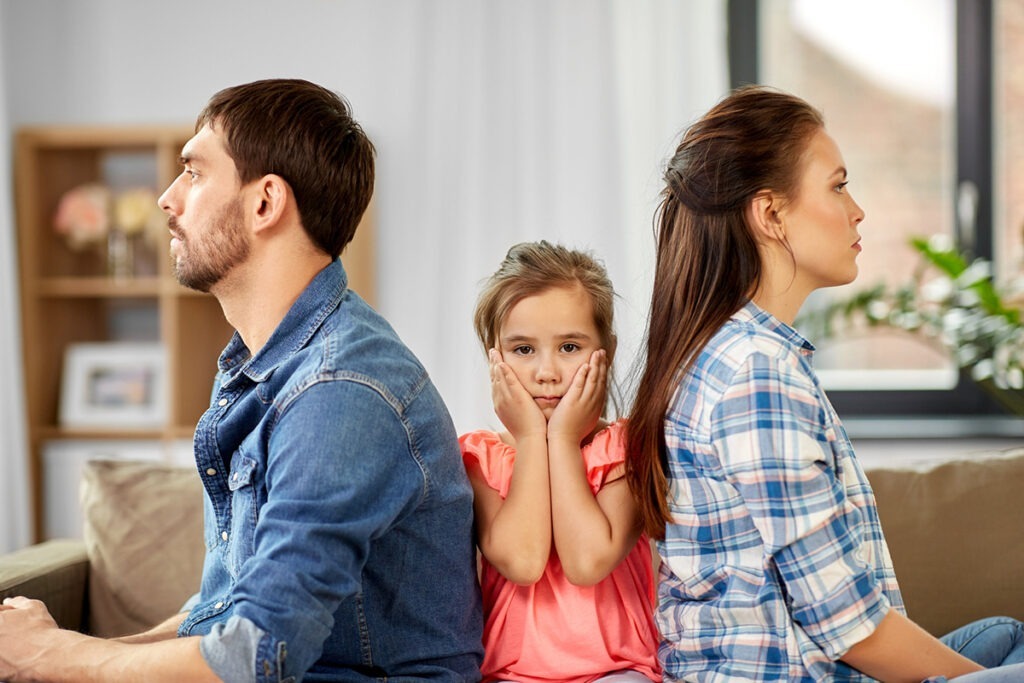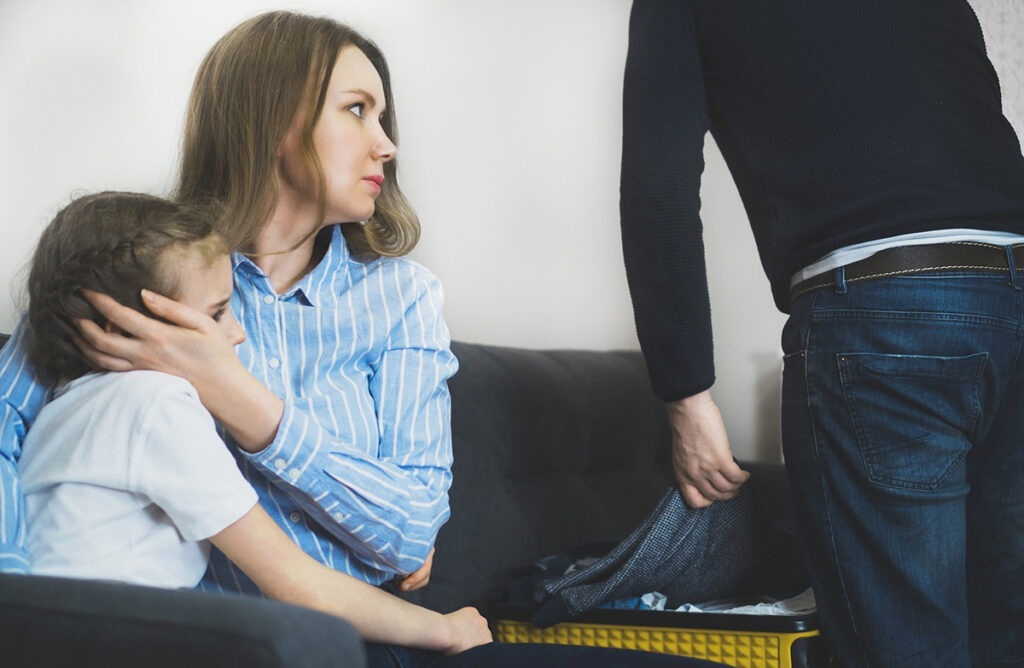50% of all marriages in the US will end in divorce. But of those that don’t, are they happy? And are kids a factor in their decision to stay together when they might otherwise divorce? What percentage of couples stay together for the kids?
Nearly 50% of married couples stay together for their kids when they would otherwise divorce. However, the benefits of staying together just for the children are debatable. That is even truer if the couple often fights and communicates poorly with one another.
Ideally, you should try to offer your kids a secure and stable environment irrespective of whether you’re still married or divorced.
In this article, I’ve put together a detailed statistical breakdown regarding unhappy couples wanting a divorce but holding it off till their kids grow up. I’ve also shared insights on whether it’s wise to hold off a divorce, the pros and cons of staying together, and how to help kids better navigate their parents’ separation.
Let’s dive in.
Divorce Statistics of Unhappy Couples With Kids
We all have our own opinions on whether a couple should stay together just for their kids. But what do the majority of the people have to say on this topic?

Several studies and surveys have been conducted revolving around divorce rates and their connection to children.
Here’s a quick look at some divorce statistics of unhappy couples with kids:
- 40% of couples in the United States stay married for their kids, even if they are unhappy.
- 28% of Americans agree that couples should stay married if they have kids.
- 47% of UK Citizens say that they only remain married because of their kids.
- 25% of married couples in the UK plan on getting a divorce once their kids grow up and move out of the house.
- Couples with 2 sons are 36.9% likely to get a divorce.
- Couples with 2 daughters have a divorce rate of around 43.1%.
- Divorce rate increases by 10% if the couple has 3 or more daughters.
- Having a baby before marriage can increase the chances of divorce by 24%.
- Couples with twins or triplets are 17% more likely to get a divorce.
- Divorce rates increase by 22.7% if the couple has a child with Attention Deficit Hyperactivity Disorder (ADHD).
- Fathers are 3% less likely to live with their daughters vs. their sons following a divorce.
- 90% of divorced mothers have custody of their children.
- Only 7% of children of divorce enjoy a co-parenting habitat.
Reasons Why Unhappy Couples Stay Together Other Than the Kids
Just like there are many reasons why couples choose to get a divorce, there are also several reasons why they’ll try to hold on to their relationship and stay together, even though they aren’t happy.
Here’s a look at the main reasons why unhappy couples stay together besides their kids:
- Getting divorced goes against their religious belief system.
- They’re afraid to end up alone.
- They’re worried about what others might think if they get a divorce.
- They’ve invested too much into the relationship, both financially and emotionally.
- They’re afraid to go back to being single again.
- One or both partners are unable to (or can’t afford to) move out and live on their own.
- They don’t have the financial resources to go through a divorce.
- They wish to give their marriage a second chance and provide time to themselves to think it through.
- They’re afraid that they’ll lose custody of their kids in the divorce proceedings.
- They may fear they won’t be able to provide their children with enough financial support after the divorce.
If your marriage is failing, then check out this quick video on the 7 Steps to Fixing Your Marriage that will help get yours back on track.
The Pros and Cons of Couples Staying Together for the Kids
Multiple research has shown that kids that grew up in two-parent households fared better compared to kids that grew up with a single parent. Therefore, many unhappy couples try to hold off a divorce just for the sake of their kids.

However, it is worth understanding why kids in two-parent households do better. In fact, in some situations, children of divorce achieve the same level of success and happiness in life as their peers who grew up with both parents.
It’s important to understand that a sense of security and stability from the family structure is pivotal during a child’s developing years. For this reason, even if the parents do get divorced, if they manage to do so amicably and maintain a proper relationship with their children, it shouldn’t result in many problems (if any at all) down the road.
To help you better decide whether staying together for the kids is the right decision, I’ve weighed the benefits and risks of staying together in an unhappy marriage.
If your marriage is failing, then check out this quick video on the 7 Steps to Fixing Your Marriage that will help get yours back on track.
Benefits of Staying Together
The main benefit of staying together for the sake of the kids is that they don’t have to go through the hardship and turmoil of seeing their parents separate.
Therefore, you get to safeguard your children from many of the problems faced by those who see their parents going through a divorce.
Here’s a quick look at some of the main benefits of staying together for your kids:
- You and your children will enjoy better financial stability. By avoiding the expensive ordeal of a divorce, you and your partner will have more money saved up. You can use this financial stability to support your kids’ educational goals or enroll them in other extracurricular activities.
- Your children will enjoy a stable environment for self-development. They won’t need to change houses, schools, or localities, which is typical for children of divorce to go through.
- Your children won’t have to face the stigma associated with divorce. Children of divorce often feel ashamed that their parents are separated and slowly detach themselves from social contact. Not to mention that many might even start blaming themselves as the reason for your divorce.
- If you can maintain an amicable relationship, it can reduce the chances of your kids developing mental health issues or behavioral problems.
Other than these, there’s also the added benefit of giving the relationship one more chance.
Time is the best healer. And if you decide to stay together for your kids, you might eventually end up solving your problems and saving your marriage.
Risks of Staying Together
It’s worth noting that the benefits of staying together for your kids are only achievable if you keep your relationship amicable and put aside your differences when parenting your children.

If you and your partner are constantly arguing in front of your kids, your rapport won’t help create a hospitable environment for their development.
Here’s a quick look at some of the serious risks of staying together for your kids:
- You build a poor example of what a relationship/marriage should look like. If you’re not happy with the marriage and still stay together, your kids will grow up to believe that’s what a marriage is – forceful cohabitation.
- The home environment can become detrimental to the kids’ development. Staying together but constantly arguing can affect your children’s mood and psyche. They can start to lose interest in their studies, develop self-esteem problems, and much more.
- You might not have the emotional energy or mental clarity to support/love your children. If you constantly feel on edge being near your partner, you can unintentionally lash out at your kids, which is never a good thing.
- The children might get stuck in the conflict. They might be forced to (or feel that they need to) pick a side. No child should be forced to choose between their parents.
- Everyone – you, your partner, and your children will be unhappy. If you and your partner stay together but constantly bicker with each other, this can affect your children’s mood as well, and lead to mental health problems.
Apart from these worrying issues, forcefully staying together in an unhappy marriage can even lead to an uglier divorce than the one you were trying to avoid. If that happens, your children will end up even more traumatized.
If your marriage is failing, then check out this quick video on the 7 Steps to Fixing Your Marriage that will help get yours back on track.
When Should You Definitely Consider Getting a Divorce?
Whether getting a divorce is the right decision in the context of raising your children is a tough question.
Both staying together and separating come with their pros & cons, and it boils down to the characteristics of each individual couple and whether they can make the relationship work for their kids.
Therefore, getting a divorce should never be a heat-of-the-moment decision.
Both you and your partner should try working things out and even consider marriage counseling. That said, there are some situations where divorce is the best decision for both you and your children.
You should definitely consider getting a divorce if your partner has abused you or your children on multiple occasions and isn’t open to changing their ways. If your partner has emotionally, physically, or sexually abused either you or your children, you should take strict action and get separated.
Sometimes abusive behavior can be managed through therapy and/or counseling.
That said, it isn’t always effective. If your partner keeps up their abusive behavior, especially if it’s actual domestic violence, it’s your responsibility as an adult and a parent to protect both yourself and your children from them.
Additionally, in situations of immediate danger where you or your child feel threatened, you should call 911 or any other abuse hotline available in your locality for help and assistance.
If your marriage is failing, then check out this quick video on the 7 Steps to Fixing Your Marriage that will help get yours back on track.
Do Your Kids Want You To Stay Together for Them?
Your kids do not want you to stay together if that means miserable parents.
Just like you want your kids to be happy, the same goes the other way around. By talking to your kids, you can even work out a co-parenting plan that ensures a happy family – although divided it may be.
Make no mistake. If it can be done, it is far better for the children to be raised in 1 home with both biological parents.
Single mothers and single fathers, no matter how well intentioned, won’t be able to provide the security, resources, and ultimately a happy home compared to if they stayed together and re-committed themselves to re-building a successful marriage.
When parents think about whether they should divorce or stay in unhappy relationships for the sake of their children, they often consult experts and talk with their friends & family members. But rarely do they stop and take into account what the kids have to say on the matter.
In fact, did you know that over 60% of children of divorce lamented that their parents didn’t involve them in the decision-making process? Whereas around 82% of children between the ages of 14 and 22 said they were okay if their parents separated.

Younger children, especially around 11 years of age, are most affected by their parent’s divorce. But even then, with time, they understand and come to terms with the family situations and adjust themselves accordingly.
Divorce affects children by pushing them into uncertainty and disrupting their normal lifestyle. However, by engaging in a conversation with your kids regarding your divorce, you empower them with relevant information.
They can now clear their doubts, present to you what they are afraid of, and create a plan with you on how they wish to orient their lives after you’ve separated.
In my own situation, my 2 older kids (14 and 15 as of this writing) would definitely have preferred us to stay together.
While there was some arguing and drama between my ex and me, 75% of that came from her and is still there even after our split. So the kids get the brunt of her mood swings either way.
How To Help Your Kids After Your Divorce
It’s always hard on children when their parents get divorced. And while some do say that their parents should get divorced if that makes them happy, it doesn’t mean that they don’t find the process heartbreaking and emotionally exhausting.
That said, as parents, both you and your partner can work together to ensure your kids are minimally affected by your divorce.
The best way to help your kids after your divorce is via co-parenting. However, if both parents aren’t available, even a single parent can ensure positive outcomes by providing a safe and secure environment for their children and seeking professional help if and when necessary.
Co-parenting refers to sharing the responsibilities of bringing up the children between the separated parents.
In this case, both parents need to put aside their differences, consider their children’s needs, and then work out a plan to ensure all their children’s requirements are met.
That said, in some divorces – for example, those resulting from an abusive partner – only one parent is given custody of the child after the divorce. In these situations, even though co-parenting isn’t technically possible, you can still ensure a positive future for your children by following the given steps:
- Make sure your children feel safe.
- Have open discussions with your children, and ask them about their problems and emotions.
- Don’t disrespect the other parent, even if your child does.
- Closely monitor your child, but also respect their privacy.
- Don’t pamper them too much. Discipline them as you normally would.
- Ensure your child has positive social support, whether from family members, friends, or a community.
- Don’t hesitate to seek professional help if you find yourself or your child in a negative headspace.
What Makes a Bad Marriage?
Ultimately, with the right actions or inactions, almost any marriage could be healthy or toxic.
Over time, the wrong choices compound and grow before eventually reaching a point of no return. And 75% of the time, it’s the wife who leaves the husband, often leaving the husband bewildered as he didn’t see it coming.
So how does that happen?
Often (but not always), the husband becomes complacent and stops wining and dining his wife. He takes her for granted, and kids, bills, and careers start to go higher on the priority list.
Now to be fair, the wife could communicate that she wants her husband to romance her more like he did when they were first mating. But most women won’t communicate that directly. They’ll hint. They will beat around the bush.
And most of the time, the guy won’t get the hint.
And eventually, the wife will fall completely out of love with her husband and he won’t even realize it. He might notice they don’t have sex as often, or maybe they argue more. But he’ll typically be clueless.
Then he’ll be totally blind-sighted when she announces she wants a divorce.
Does a Lack of Sex Create a Bad Marriage?
In short, a mediocre or non-existent sex life can lead to a bad marriage.
Now that’s because sex is the most important aspect of a marriage. But because when a couple isn’t having sex regularly, as happens in healthy marriages, the couple becomes at higher risk of becoming irritable, stressed, or maybe even seeking an affair outside the marriage.
In fact, a lack of sex is often the leading cause of stress among married couples, after money worries.
Healthy marriages definitely place a high priority on sex. But how much sex is good? The national average amount of sex is 1-2 times per week. (source)
But I would put out there that a minimum of 3 times a week is better for married parents.
When we have sex, endorphins and oxytocin are released in the brain. The result of that release is an increase in intimacy with our partner and a release of stress. In other words, it goes a long way to make us happier and better connected to our spouse.
So while for busy parents, more than 3 times a week, might not be realistic, 3 times a week, will go a long way toward keeping the couple together.
What is the Result of Unhappy Marriages?
Unhappy marriages that don’t (yet) end in divorce lead both spouses down dark paths.
Now best case scenario, each partner just builds separate lives with different hobbies, different friend groups, etc. They may even have an agreement about lovers on the side. They aren’t connected to one another but at least there isn’t animosity.
But far more often an unhappy marriage will lead to regular marital conflicts, affairs, and ultimately end up with the 2 spouses hating each other.
And THAT can be far worse for your kids than seeing you amicably separate and start new lives and eventually start new healthy relationships with other people.
Conclusion
Around 40-50% of unhappy couples stay together during this difficult time thinking it’s best for their children. This might be true, and staying together may be a good decision if you can provide an amicable and safe environment for your kids.
However, this isn’t always possible for parents who are contemplating getting a divorce. Therefore, instead of staying together and creating an unhappy and negative home environment, it’s often better to get a divorce.
You CAN fix your marriage — if you’re going to stay together, why not make it amazing?
I’ve been in your shoes. You want to stop hurting. And you desperately want to restore trust, mutual acceptance, and respect to your marriage; even when you and your spouse are just going through the motions.
Luckily, all hope is NOT lost, and there is something you can do, even if your spouse seems reluctant or unsure.
Mend the Marriage is a course developed by renowned marriage expert Brad Browning who has well over half a million subscribers on his YouTube channel.
This quote from Brenda R. perfectly sums up the quality work Mend the Marriage does:
“Brad Browning’s “Mend the Marriage” program is easily the most comprehensive and most effective guide to stopping divorce and saving your marriage. After reviewing a number of similar products, I recommend “Mend the Marriage” as the #1 choice for anyone facing a marriage crisis.”
Serious about saving or improving your relationship?
CLICK HERE to watch this free short video from Brad.
(source)

Drop a link to your favorite blog post of yours in the comments below, I’d love to read more.
I appreciate your creativity and the effort you put into every post. Keep up the great work!
Thanks! Jeff
Your latest blog post was truly inspiring and had some great insights. I can’t wait to see what else you have in store.
Thanks! Jeff
I can’t get enough of your insightful articles and engaging stories. Thank you for sharing your passion with the world!
Thank you!!
Jeff
Keep up the fantastic work!
Thanks!
Jeff
Keep up the fantastic work and continue to inspire us all!
Thanks!
Drop a link to your favorite blog post of yours in the comments below, I’d love to read more.
Here’s one of my favorites – https://divorcedparentsclub.com/how-to-tell-when-your-marriage-is-really-over/
Thanks for being here!
Jeff
Share with us in the comments your favorite blog posts of all time!
Here’s one of my favorites – https://divorcedparentsclub.com/how-to-tell-when-your-marriage-is-really-over/
Thanks for being here!
Jeff
We just wanted to take a moment to acknowledge all the hard work and effort you’ve been putting in lately. Keep up the amazing job, you’re doing great!
Thanks!
Jeff
Nice blog here! Also your site loads up very fast! What host are you using? Can I get your affiliate link to your host? I wish my site loaded up as quickly as yours lol
Thanks! Here it is – https://portal.bigscoots.com/?affid=1859
Looking forward to your next post. Keep up the good work!
Thanks!
Jeff
Keep up the amazing work! Can’t wait to see what you have in store for us next.
Thanks!
Jeff
This blog post is worth the read – trust us!
Thanks!
Jeff
I can’t get enough of your insightful articles and engaging stories. Thank you for sharing your passion with the world!
Thanks!
Jeff
Fantastic site. A lot of helpful info here. I’m sending it to some buddies ans additionally sharing in delicious. And naturally, thanks on your sweat!
Thanks!
Jeff
This blog post is worth the read – trust us!
Thanks!
Jeff
Your blog is always a highlight of my day
Thanks!
Jeff
Thank you for the amazing blog post!
Thanks!
Keep up the amazing work! Can’t wait to see what you have in store for us next.
Thank y9ou very much! I appreciate that!
Jeff
We just wanted to take a moment to acknowledge all the hard work and effort you’ve been putting in lately. Keep up the amazing job, you’re doing great!
Thank y9ou very much! I appreciate that!
Jeff
Your latest blog post was truly inspiring and had some great insights. I can’t wait to see what else you have in store.
Thank y9ou very much! I appreciate that!
Jeff
I really like reading through a post that can make men and women think. Also, thank you for allowing me to comment!
Thank y9ou very much! I appreciate that!
Jeff
Simply wish to say your article is as amazing The clearness in your post is just nice and i could assume youre an expert on this subject Well with your permission let me to grab your feed to keep updated with forthcoming post Thanks a million and please carry on the gratifying work
Thank y9ou very much! I appreciate that!
Jeff
Keep up the fantastic work and continue to inspire us all!
Thanks!
Jeff
Your blog post had me hooked from the first sentence.
Thanks so much!
Jeff
Keep up the amazing work! Can’t wait to see what you have in store for us next.
Thanks so much!
Jeff
My brother recommended I might like this web site. He was totally right. This post actually made my day. You cann’t imagine just how much time I had spent for this information! Thanks!
Thanks so much!
Jeff
Thank you for the amazing blog post!
Thanks so much!
Jeff
This blog post has left us feeling grateful and inspired
Thank you!
Jeff
Thank you for the amazing blog post!
Thank you!
Jeff
The humor in your posts is a mood lifter! Laughter is indeed the best medicine, and your comedic timing is impeccable. Thanks for the daily dose of joy.
Thank you! I agree!
Jeff
Your DIY tips are a lifesaver! Tried them and saw instant results. You have a knack for making things simpler and more efficient.
Thanks!
Jeff
Keep up the amazing work! Can’t wait to see what you have in store for us next.
Thank you!
Jeff
Keep up the amazing work! Can’t wait to see what you have in store for us next.
Thank you!
Jeff
Your latest blog post was truly inspiring and had some great insights. I can’t wait to see what else you have in store.
Thank you!
Jeff
Your blog posts never fail to entertain and educate me. I especially enjoyed the recent one about [insert topic]. Keep up the great work!
Thank you!
Jeff
Keep up the fantastic work and continue to inspire us all!
Thank you!
Jeff
Keep up the amazing work!
Thank you!
Jeff
I can’t get enough of your insightful articles and engaging stories. Thank you for sharing your passion with the world!
Thanks!
Jeff
Your blog post had me hooked from the very beginning!
Thank you!!
Jeff
I appreciate your creativity and the effort you put into every post. Keep up the great work!
Thank you!!
Jeff
Your latest blog post was truly inspiring and had some great insights. I can’t wait to see what else you have in store.
Thanks!
Jeff